


The article focuses on essential market access strategies that are crucial for the success of clinical research, particularly in the context of innovative therapies in Latin America. It emphasizes the importance of:
These strategies significantly increase the chances of successful commercialization and patient access.
In the competitive landscape of clinical research, the quest for successful market access strategies has never been more critical. Organizations are increasingly recognizing the need to navigate complex regulatory environments and stakeholder expectations to bring innovative therapies to market effectively. This article delves into ten essential strategies that can empower clinical researchers to enhance their market access efforts, from early assessments and economic modeling to leveraging key opinion leaders and streamlining prior authorization processes.
How can these strategies be effectively implemented to ensure not only compliance but also a competitive edge in the rapidly evolving healthcare sector?
bioaccess® distinctly positions itself within the research environment by leveraging the regulatory advantages offered by Latin America, particularly Colombia. This strategic choice results in substantial cost reductions exceeding 30% compared to North America and Western Europe. The regulatory efficiency in Colombia is noteworthy, with ethical approvals achieved in a mere 90-120 days. This rapid turnaround facilitates swift site activation and adherence to FDA/EMA/MDR standards, significantly expediting research trials and enhancing the likelihood of successful market access strategies for pioneering Medtech, Biopharma, and Radiopharma products.
Colombia's healthcare system, recognized among the best globally, guarantees high-quality patient care. Its diverse population of over 50 million presents a robust recruitment pool, with 95% of individuals covered by universal healthcare. Additionally, the Colombian government offers attractive R&D tax incentives, including a full 100% tax deduction for investments in science and technology, further encouraging research initiatives. By streamlining the complexities associated with medical research, bioaccess® empowers companies to confront challenges confidently, ultimately leading to improved patient outcomes and the implementation of effective market access strategies for the expedited commercialization of innovative therapies.
The impact of regulatory speed on research success rates is profound; studies indicate that organizations capitalizing on these advantages can achieve enrollment rates that are 50% faster than those in traditional sectors. As highlighted by Maureen Maurer from the American Institutes for Research, 'The actions of funders and institutions to support engagement... are necessary to see the impacts we observed in this study in health research more broadly.' This statement emphasizes the crucial role of bioaccess® in fostering effective stakeholder engagement and enhancing trial outcomes.
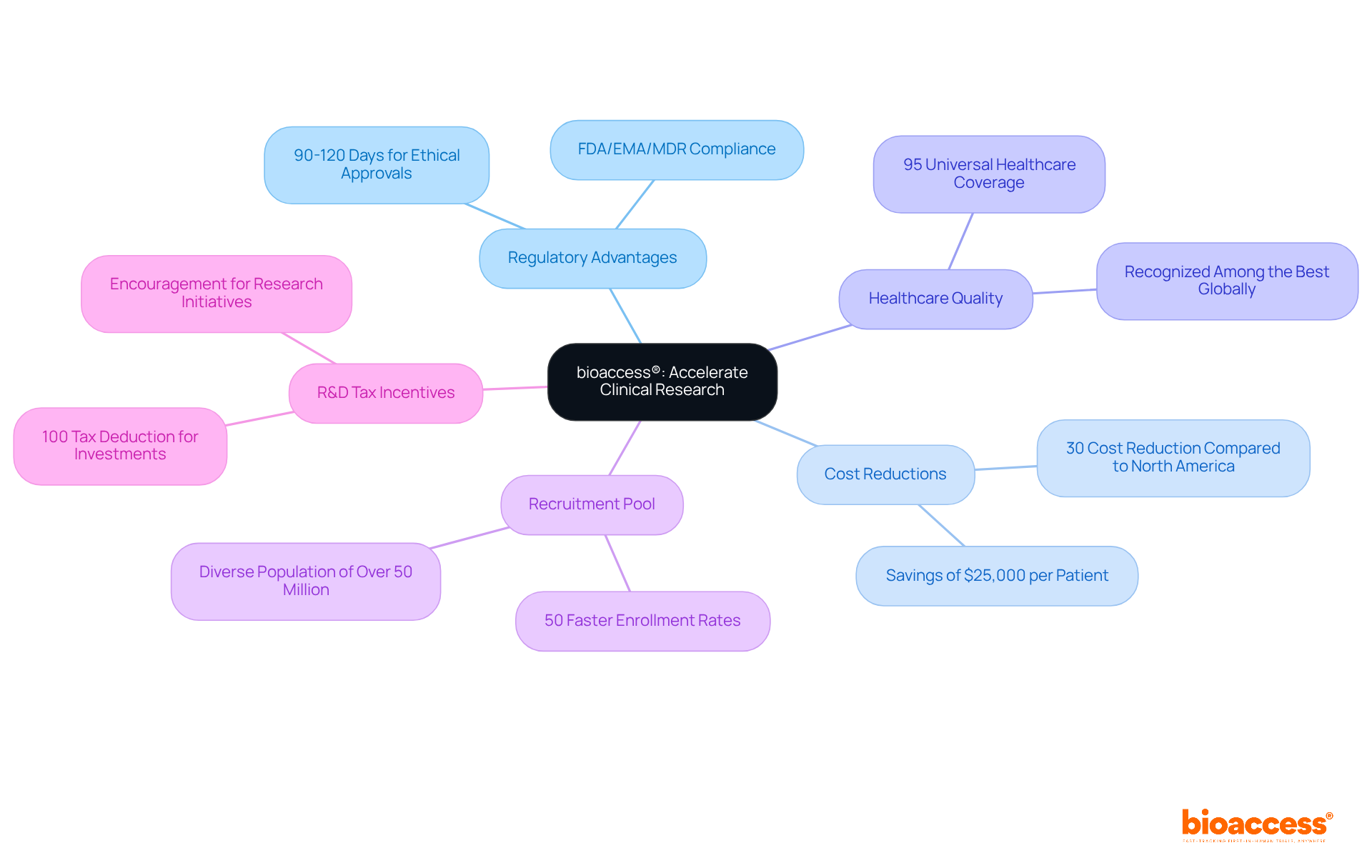
An early evaluation of your commerce entry plan is crucial for ensuring that your research aligns with industry requirements. This process involves:
By clearly outlining your market access strategies from the outset, you can tailor your clinical trials to generate data that facilitates product entry, significantly enhancing the likelihood of a successful product launch and reimbursement. Engaging with stakeholders early in the process not only provides valuable insights but also informs your strategy, ultimately improving overall outcomes.
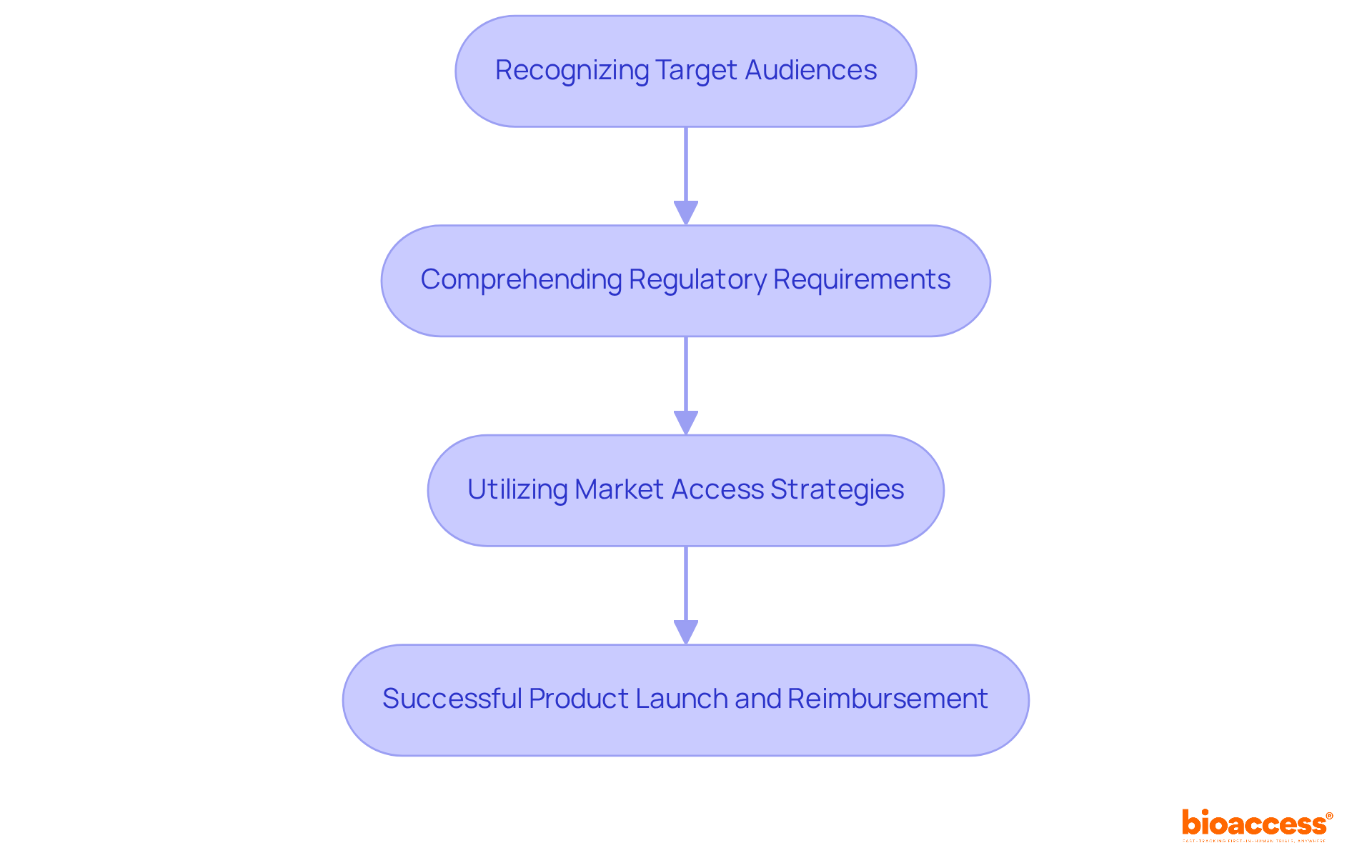
Acquiring a thorough understanding of the healthcare systems in your target areas is essential for creating effective market access strategies. This involves a deep dive into the regulatory landscape, reimbursement processes, and the competitive environment. In Colombia, the INVIMA (National Food and Drug Surveillance Institute) plays a pivotal role as a Level 4 health authority, overseeing medical device regulation and classification. Comprehensive research enables you to identify key stakeholders, acknowledge potential challenges, and discover opportunities for your product by implementing effective market access strategies.
Collaborations, such as that between bioaccess™ and Welwaze Medical Inc. for the launch of the Celbrea® medical device, exemplify how strategic partnerships can facilitate regulatory access and enhance market entry. Moreover, bioaccess™ provides extensive research study management services, including:
Such insights are invaluable; they not only guide your trial design but also assist in developing market access strategies that resonate with payers and healthcare providers.
This strategic approach ultimately facilitates a smoother entry into the industry, aligning with current trends in the regulatory landscape for Medtech and Biopharma, and ensuring that your innovations meet the evolving needs of the healthcare sector.
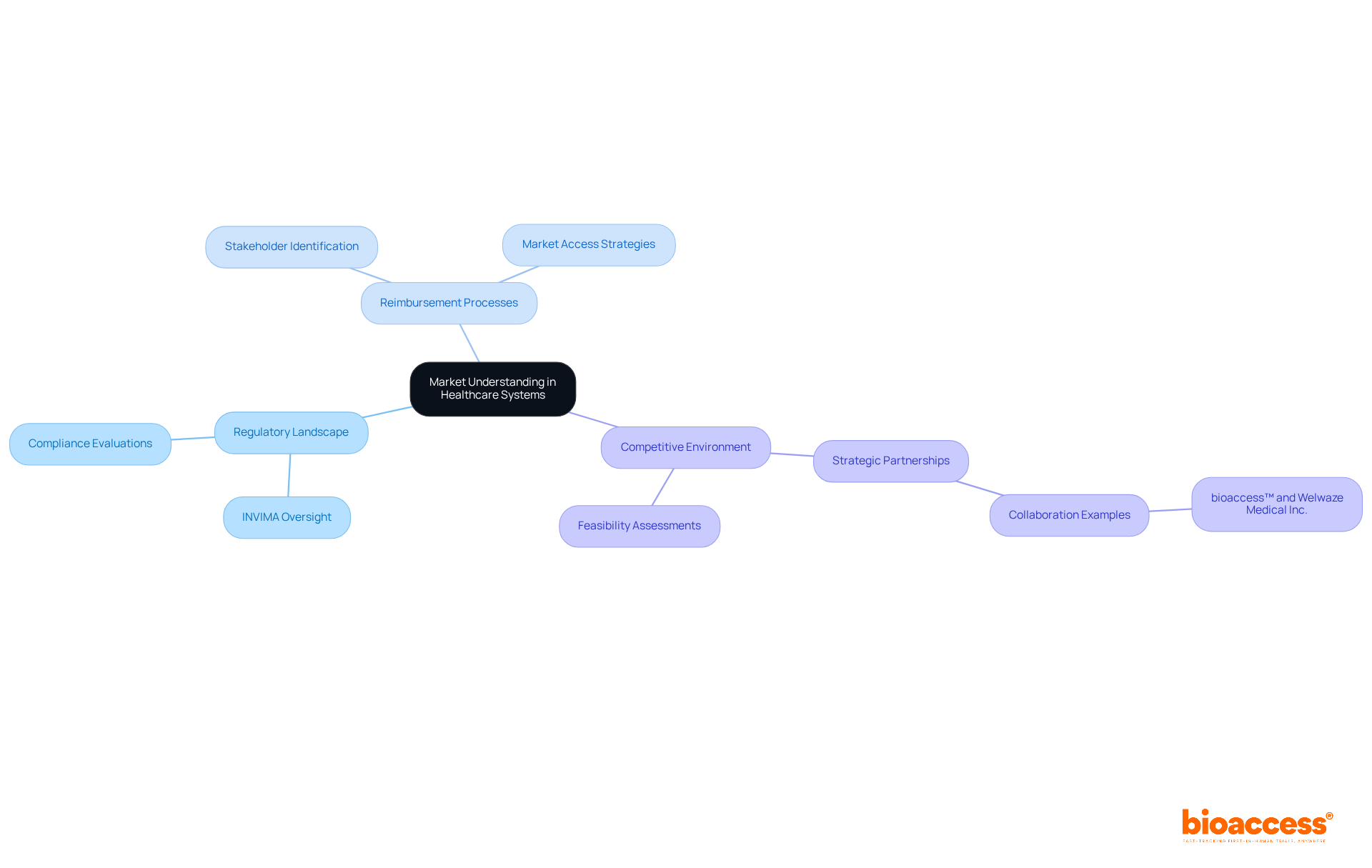
Creating robust economic models is a key strategy within market access strategies for demonstrating the value of your product to payers. These models should highlight the cost-effectiveness of your intervention compared to existing treatments, taking into account factors such as:
Moreover, when medical studies are conducted in local economies, they not only create jobs and promote economic growth but also enhance healthcare systems and encourage international collaboration. By showcasing clear and compelling value propositions that illustrate these wider economic effects, you can improve your negotiations with payers and boost the chances of obtaining favorable reimbursement conditions, which is crucial for successful market access strategies in the industry.
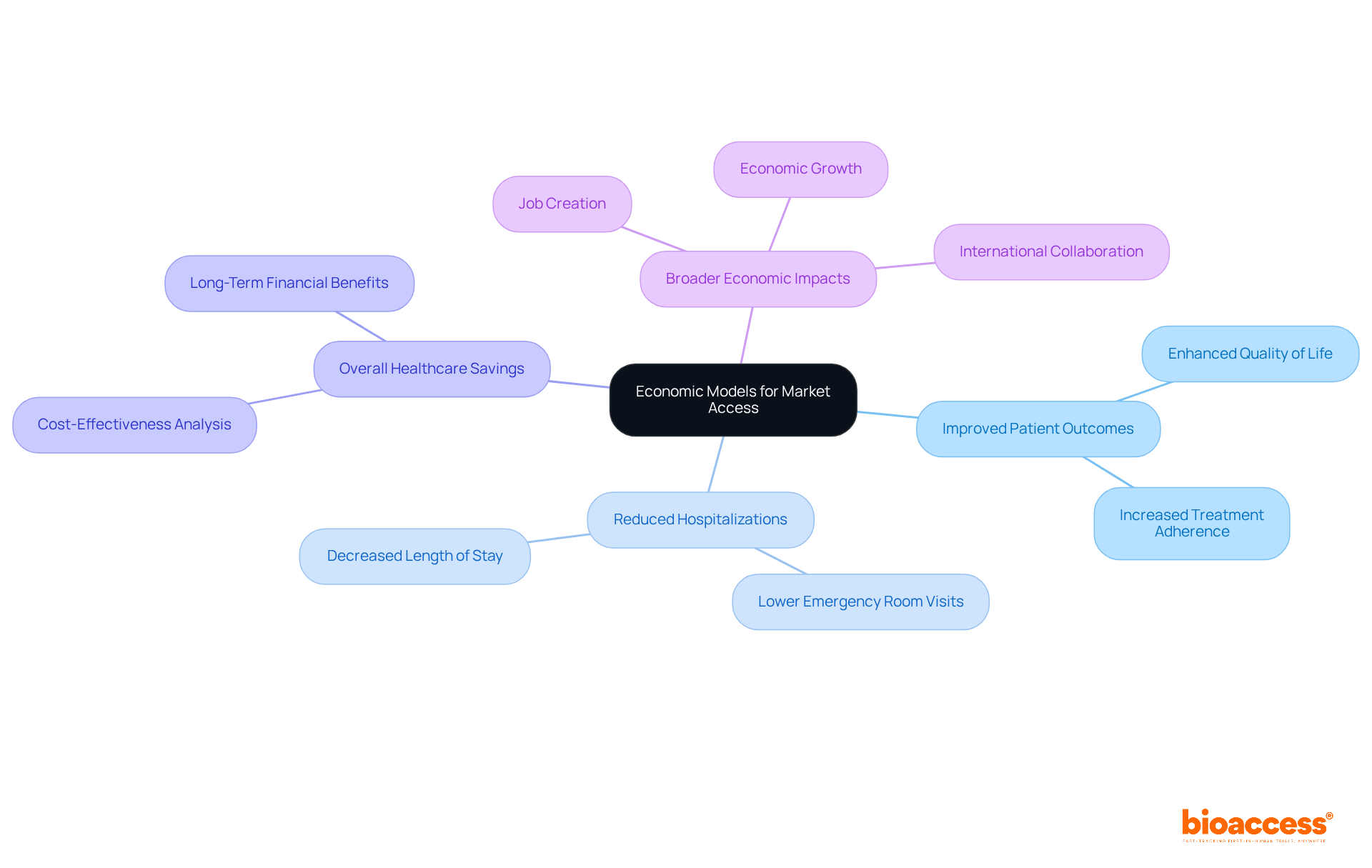
Conducting pricing and reimbursement negotiations is a critical endeavor that necessitates market access strategies, balancing payer needs with the inherent value of your product. To prepare for these vital discussions, it is essential to gather comprehensive information regarding your product's medical and economic advantages. Engage in transparent dialogue with payers, addressing their concerns while demonstrating how your product aligns with their objectives. Moreover, cultivating robust relationships with key stakeholders can support effective market access strategies, facilitating smoother negotiations and ultimately leading to more favorable outcomes.

Involving key opinion leaders (KOLs) is a crucial strategy for enhancing accessibility in research studies. KOLs offer invaluable insights into clinical practices and can validate both the clinical and economic advantages of your product. By engaging KOLs early in the development process, you secure their support and advocacy, which positively influences payer perceptions and facilitates a smoother entry into the industry. Moreover, KOLs play a pivotal role in disseminating research findings and promoting your product within their professional networks, significantly enhancing its visibility and acceptance.
Effective KOL engagement can lead to improved decision-making and increased compliance among healthcare providers, ultimately resulting in better patient outcomes. As the landscape evolves, maintaining strong relationships with KOLs becomes essential for navigating the complexities of market access strategies and ensuring the successful adoption of innovative therapies. bioaccess® can enhance this engagement by offering expedited trial services, including feasibility studies, compliance reviews, and comprehensive project management.
Utilizing technology in stakeholder engagement can also be transformative, facilitating timely feedback and reducing logistical challenges. To maximize the impact of KOL engagement, consider implementing tactical activities such as message testing and asynchronous feedback exercises. These methods can provide actionable insights and strengthen your engagement strategy.
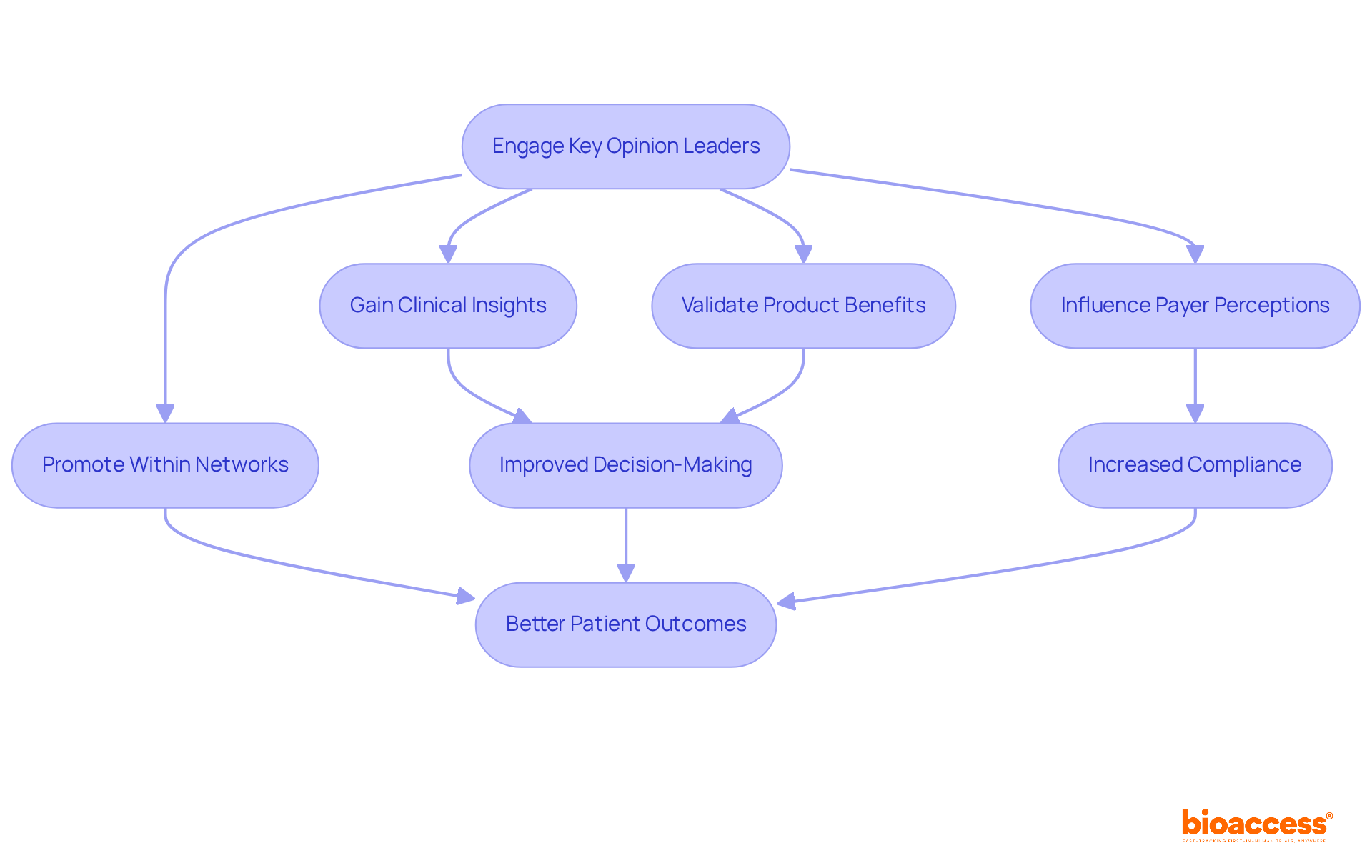
Incorporating Health Economics and Outcomes Research (HEOR) into your entry strategy is essential for enhancing your product's influence. HEOR provides compelling evidence of both the economic value and therapeutic effectiveness of your intervention, a critical factor in persuading payers of its significance. By integrating HEOR data into clinical trials, you not only strengthen your value proposition but also improve your market access strategies and increase your chances of securing reimbursement.
A systematic review revealed that 28 out of 42 studies employed life cycle assessment methods, highlighting the vital role of economic evaluations in demonstrating sustainability and cost-effectiveness. Furthermore, successful health economics research indicates that including patient engagement data in regulatory decision-making can identify gaps and enhance outcomes, thereby boosting your product's attractiveness to payers.
The impact of Medtech research extends beyond individual products; it generates employment, stimulates economic development, and strengthens healthcare systems in the regions where it is conducted. This international collaboration not only benefits local economies but also elevates the global standing of healthcare innovations.
As the landscape evolves, staying informed about the latest developments in health economics outcomes research will be crucial for effectively navigating payer negotiations in 2025.
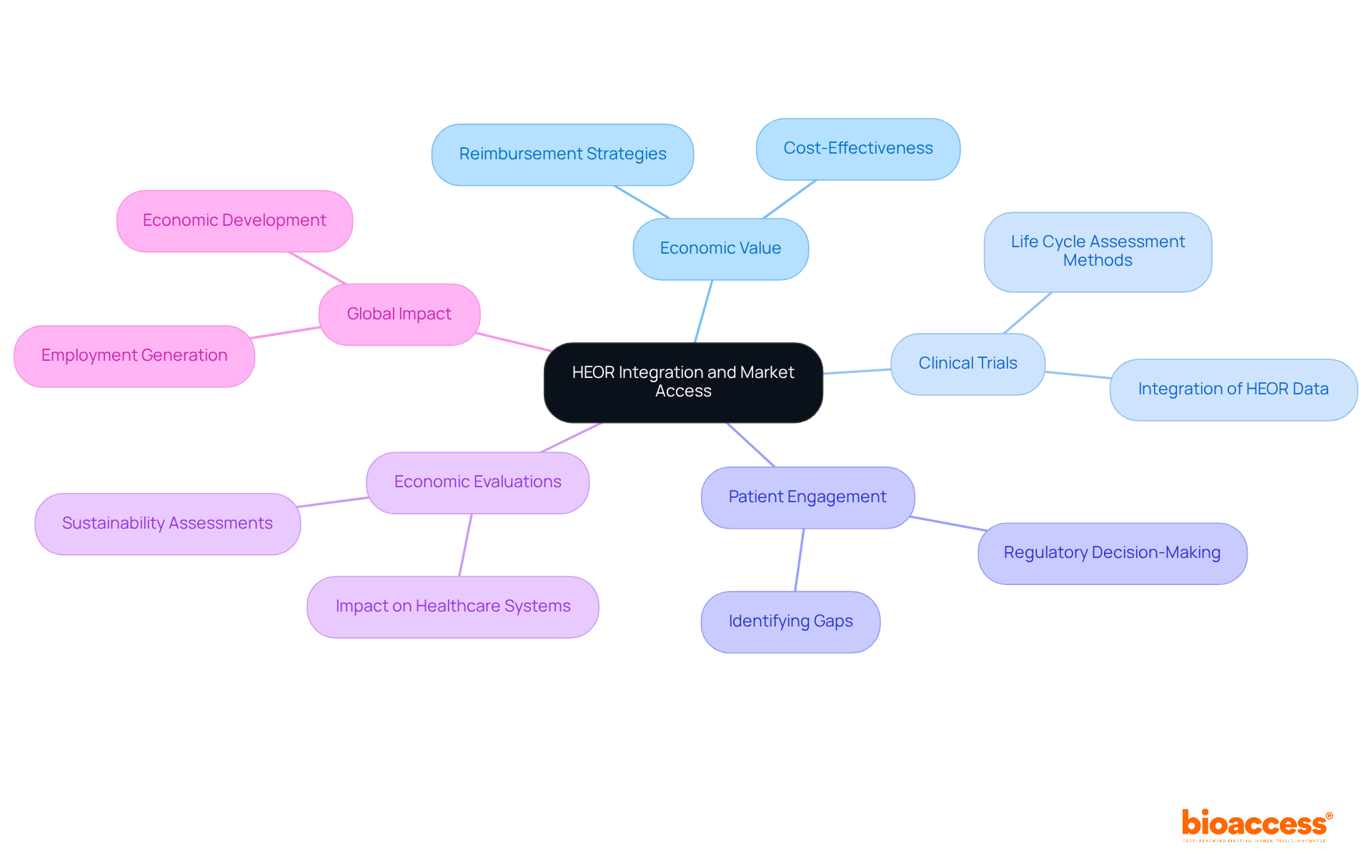
Creating a cross-disciplinary team is essential for successfully managing the intricacies of entering the marketplace. This team should encompass experts from clinical research, regulatory affairs, health economics, and commercial strategy. By encouraging cooperation among these varied fields, all aspects of market entry can be tackled thoroughly. This integrated approach not only streamlines market access strategies but also significantly increases the chances of a successful product launch and reimbursement.
At bioaccess®, directed by co-founder Julio Martinez-Clark, who possesses over 15 years of expertise in overseeing early-phase research studies, collaboration in research can result in significant enhancements in patient safety and study procedures. Julio's knowledge in regulatory matters and his role in assisting startups in executing effective research studies further highlight the significance of having experienced professionals on the team. Collaborating with diverse groups encourages creative approaches to research obstacles, especially in developing regions such as Latin America, where bioaccess® is leading the way in expediting research studies.
Furthermore, with the average time for a new medication to go from candidate nomination to launch being about 12 years, leveraging strategic partnerships can help secure funding for clinical trials and enhance the overall process. As the landscape evolves, these partnerships will be crucial for implementing effective market access strategies to ensure prompt and efficient entry into the industry.
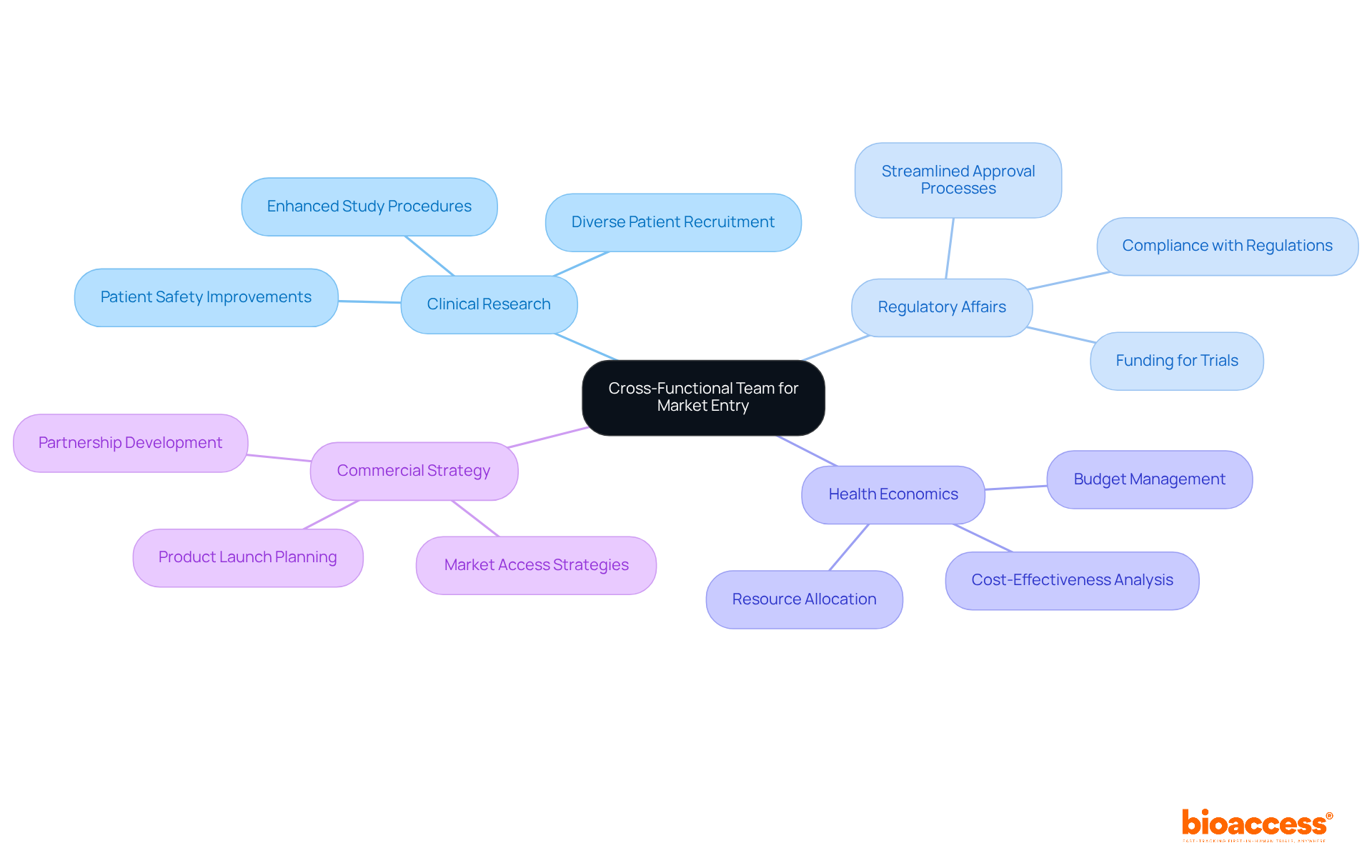
HUB services are essential in optimizing the prior authorization procedure, a frequent barrier to entry in clinical research. By offering comprehensive support in documentation, patient education, and direct communication with payers, HUB services significantly reduce friction, thereby increasing the chances of timely approvals. This proactive approach not only improves patient availability to innovative products but also cultivates stronger relationships with payers, resulting in more effective negotiations and enhanced overall outcomes.
In 2023, nearly 50 million prior authorization determinations were made by Medicare Advantage insurers, highlighting the scale of this challenge. With a denial rate of 6.4% for prior authorization requests, translating to 3.2 million denied requests, the need for efficient HUB services becomes even more critical. By employing effective market access strategies that concentrate on minimizing payer friction, organizations can navigate the complexities of the marketplace more efficiently.
Furthermore, utilizing bioaccess's expedited research services can improve entry strategies further. With more than 15 years of experience in overseeing early-phase research studies, bioaccess offers the knowledge required to navigate regulatory approvals and study setups effectively. This combination of HUB services with research management guarantees that innovative therapies can reach patients more quickly, addressing both healthcare and distribution challenges.
Expert opinions suggest that the integration of standardized electronic prior authorization submissions, set to be implemented by January 1, 2027, will enhance the efficiency of HUB services. This initiative aims to create transparent processes that facilitate quicker turnaround times, ultimately benefiting both patients and providers. As the healthcare environment evolves, utilizing HUB services alongside bioaccess's research expertise will be crucial for achieving research success and ensuring that innovative therapies reach those in need.
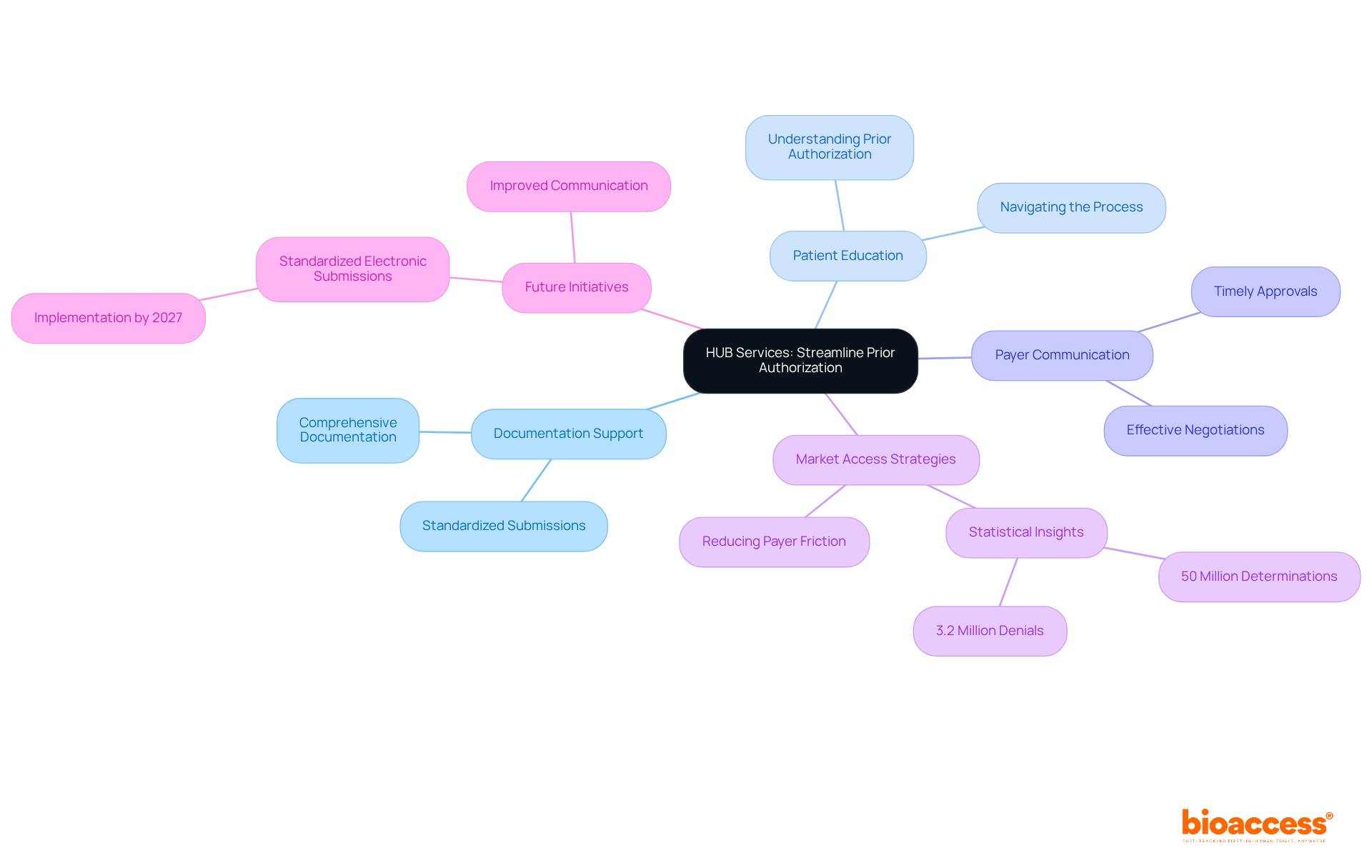
Planning for optimal formulary placement is essential in market access strategies. It is vital to understand the market access strategies that payers use when assessing products for inclusion on their formularies. Proactively addressing these factors during trials and negotiations can significantly enhance your product's chances of being included. By effectively demonstrating the clinical and economic value of your product, you improve patient access and support successful commercialization.
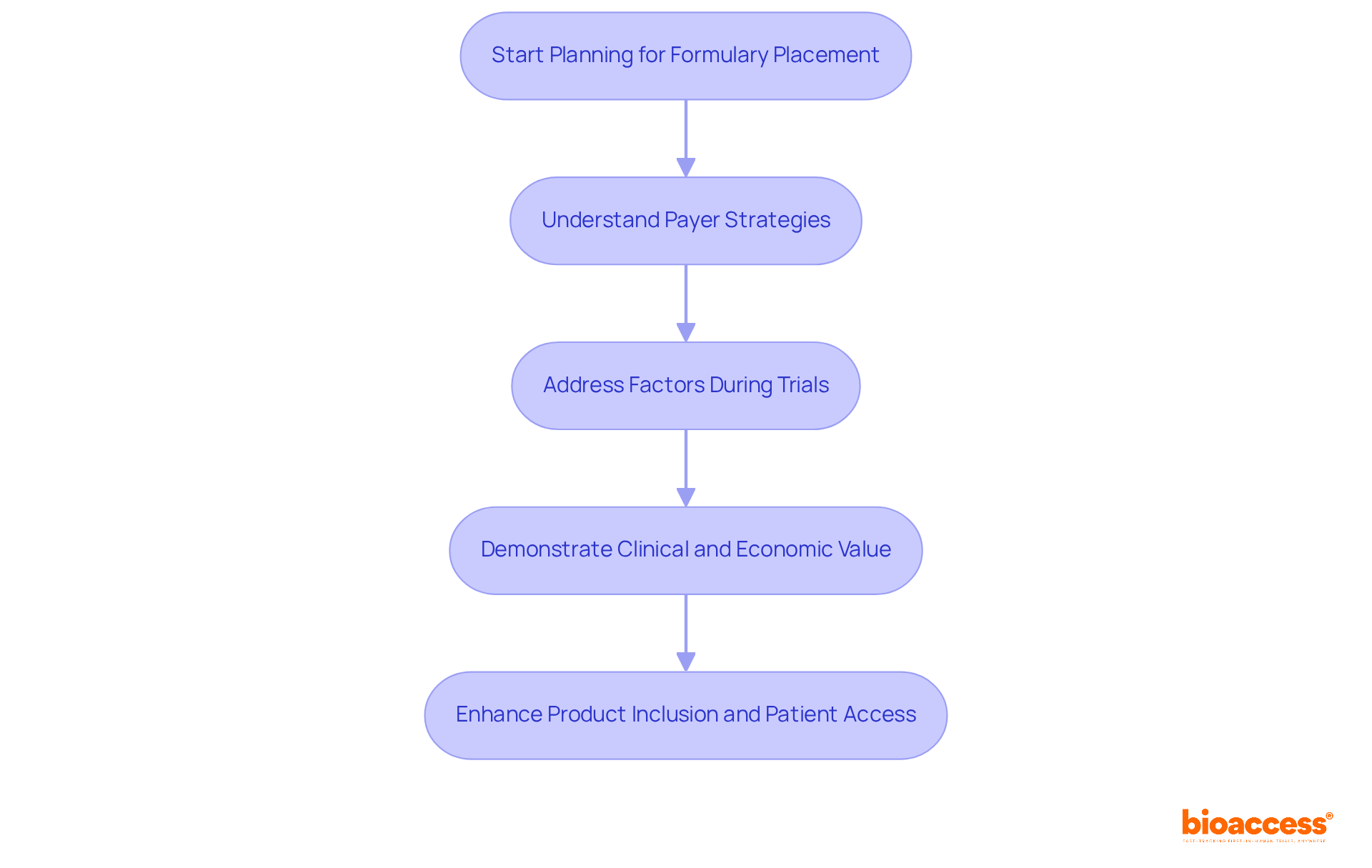
The strategies for achieving successful market access in clinical research are multifaceted and crucial for the expedited commercialization of innovative therapies. By leveraging regulatory advantages, particularly in regions like Colombia, organizations can significantly reduce costs and accelerate the approval process. The emphasis on early assessment of market access strategies ensures that clinical trials are aligned with industry requirements, ultimately increasing the chances of successful product launches.
Key insights from the article highlight the importance of understanding healthcare systems, creating robust economic models, and engaging key opinion leaders. These elements are essential for developing effective market access strategies that resonate with payers and healthcare providers. Additionally, the integration of Health Economics and Outcomes Research (HEOR) enhances the value proposition of products, making them more attractive to stakeholders.
As the landscape of clinical research continues to evolve, it becomes imperative for organizations to adopt a proactive and strategic approach to market access. By assembling cross-functional teams and utilizing HUB services to streamline prior authorization, companies can navigate the complexities of the marketplace more efficiently. Embracing these best practices will not only facilitate smoother entry into the industry but also ensure that innovative therapies reach patients in need, ultimately improving healthcare outcomes worldwide.
What is bioaccess® and how does it benefit clinical research?
bioaccess® accelerates clinical research by leveraging regulatory advantages in Latin America, particularly Colombia, resulting in cost reductions exceeding 30% compared to North America and Western Europe. It achieves ethical approvals in 90-120 days, facilitating swift site activation and adherence to FDA/EMA/MDR standards, which expedites research trials.
Why is Colombia considered a favorable location for clinical research?
Colombia's healthcare system is among the best globally, ensuring high-quality patient care. The country has a diverse population of over 50 million, with 95% covered by universal healthcare, providing a robust recruitment pool. Additionally, the Colombian government offers attractive R&D tax incentives, including a full 100% tax deduction for investments in science and technology.
How does regulatory speed impact research success rates?
Regulatory speed significantly impacts research success rates, with studies indicating that organizations leveraging these advantages can achieve enrollment rates that are 50% faster than traditional sectors.
What is the importance of an early assessment in market access strategy?
An early assessment of your market access strategy is crucial for aligning research with industry requirements. It involves recognizing target audiences, understanding regulatory requirements, and utilizing market access strategies to anticipate potential entry obstacles.
How can engaging with stakeholders early in the process improve outcomes?
Engaging with stakeholders early provides valuable insights that inform your strategy, ultimately improving overall outcomes and enhancing the likelihood of a successful product launch and reimbursement.
What are the key components of understanding healthcare systems for market access?
A thorough understanding of healthcare systems involves analyzing the regulatory landscape, reimbursement processes, and competitive environment. In Colombia, the INVIMA oversees medical device regulation and classification, which is essential for creating effective market access strategies.
What services does bioaccess® provide for research study management?
bioaccess® offers extensive research study management services, including feasibility assessments, site selection, compliance evaluations, study setup, project oversight, and reporting.
How do collaborations enhance market entry for medical products?
Collaborations, such as the one between bioaccess™ and Welwaze Medical Inc. for the Celbrea® medical device, demonstrate how strategic partnerships can facilitate regulatory access and enhance market entry, ultimately aligning innovations with the evolving needs of the healthcare sector.